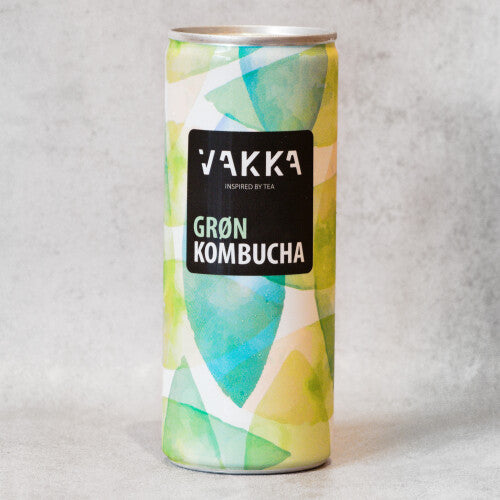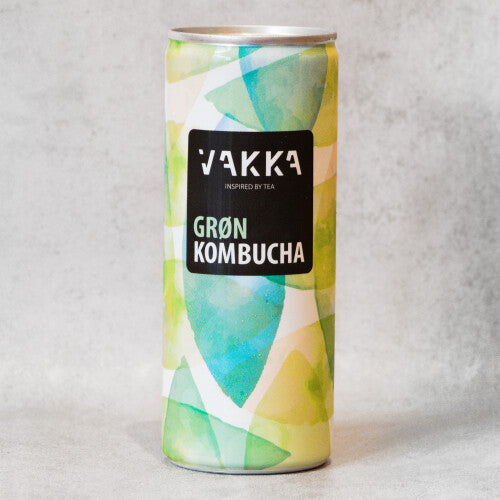According to an article in Forbs Health, there are many good reasons to drink kombucha (source: see bottom of this blog)
In recent years, Kombucha has gained traction in the retail industry worldwide and thus also in Denmark. You may be wondering why this tart and bubbly drink has become so popular. Besides kombucha's good taste, the reason is the many claims about kombucha's health benefits.
What is Kombucha?
In short, Kombucha is a fermented drink made from tea and sugar. As you have been able to read in other of VAKKA's blogs, kombucha is made from black or green tea and sugar. To make kombucha, bacteria and yeast are added in the form of a SCOBY (symbiotic culture of bacteria and yeast) and a sugar mixture.
The mixture then ferments for a few weeks and the yeast converts the sugar into ethanol, which acetic acid bacteria then convert into acetaldehyde, a compound commonly found in the surrounding environment, and acetic acid, a byproduct of fermentation that gives vinegar its characteristic smell.
This fermentation produces a sour, fizzy drink that is rich in probiotic bacteria. While microbial species can vary from one batch of kombucha to another, the most common microorganisms in brewed kombucha include Komagataeibacter, Lyngbya, Gluconobacter, Lactobacilli, and Bifidobacteria, along with several genera of yeast.
The Possible Health Benefits of Kombucha
There has been a lot of focus on the gut microbiome in the last few years and it is this research that may support kombucha's potential health benefits. However, it should be pointed out that despite a widespread belief that kombucha provides health benefits, there is currently only limited human scientific research to support this, but regardless, kombucha tastes great.
As we take a closer look at five of kombucha's potential health benefits and the existing research, it's important to keep in mind that most of the available research has been conducted on animals, making it difficult to draw conclusions about its effects on humans.
Rich in antioxidants and other nutrients
After fermentation, kombucha contains many bioactive compounds and nutrients that can be beneficial to health. Kombucha is a potential source of vitamins B1, B2, B6, B12 and C as well as polyphenols and antioxidants. In addition, Kombucha contains a number of important minerals such as copper, iron, manganese, nickel and zinc, which makes it a good supplement to a healthy balanced diet.
May increase intestinal health
Some of the strongest evidence regarding kombucha's health benefits is its effect on gut health. Because it is fermented with a SCOBY that contains different strains of beneficial bacteria and yeast, kombucha is a good source of probiotics.
Kombucha is a fermented tea that contains different species of bacteria and yeast, and when consumed, it can help create a diverse and balanced microbiome that can inhibit the growth of disease-causing bacteria and promote the growth of healthy bacteria in the gut. The microbiome helps digest, absorb and assimilate nutrients from your food, and consuming kombucha can help in this process.
A 2021 review in Critical Reviews in Food Science and Nutrition concludes that kombucha benefits the gut microbiome. In particular, animal studies suggest that consuming kombucha can increase the abundance of Lactobacillus – a species of bacteria known for its probiotic and anti-inflammatory effects – in the gut.
May support healthy cholesterol levels
Animal studies suggest that kombucha may promote healthy cholesterol levels. A review of studies found that kombucha lowered total cholesterol, triglycerides, LDL cholesterol, and VLDL cholesterol in animal studies. However, no human trials have been conducted to support these results, so we can only hope that the same benefits can occur in humans.
May help improve glucose tolerance
Evidence from animal studies suggests that traditionally made kombucha can help control blood sugar levels and affect the development of diseases associated with gut bacteria.
In a 2022 animal study in Biomedicine and Pharmacotherapy, mice with diet-induced obesity, prediabetes, high blood sugar, and features of nonalcoholic fatty liver disease (NAFLD) were given either kombucha tea or tap water daily for nine days—which the authors note is equivalent to a year of continuous use in people
The mice given the kombucha tea supplement had a 10% reduction in blood sugar levels, improved glucose tolerance and reduced glucose-induced insulin secretion without changes in body composition. They also experienced a reduction in liver changes associated with NAFLD.
It is important to note that the kombucha used in the study was made traditionally without the addition of sugar, juice or other flavorings common in many commercial kombuchas. Not enough human trials have been done, so we don't know yet whether kombucha can also affect glucose tolerance and help control blood sugar in humans.
May offer antimicrobial properties
Despite being a source of friendly bacteria, kombucha's bioactive compounds and acetic acid content may provide antimicrobial properties that can help prevent or treat stomach and intestinal infections.
A 2021 review of studies found that kombucha exhibits antimicrobial activity against a broad spectrum of microorganisms. For example, an older study in Engineering in Life Sciences showed that kombucha inhibited the growth of Helicobacter pylori (a bacterium that causes stomach ulcers), Staphylococcus aureus (a bacterium that causes skin and soft tissue infections), and Escherichia coli (a bacterium that found in the environment, food and intestines of humans and animals). However, more human research is needed to know if kombucha can effectively help prevent or treat stomach and intestinal infections.
How to choose the best Kombucha
Not all kombuchas are equally healthy, because unlike VAKKA's traditionally made kombucha, many producers add extra sugar, herbs, spices, aromas or juice after fermentation is complete.
You must go for simple ingredients, i.e. a kombucha must only contain tea, water, sugar and microbial cultures. It is best if the tea is organic as it provides the healthiest fermentation.
This blog describes some of the health benefits of drinking kombucha. The content of the blog is taken with inspiration from an article published in Forbs Health 9 June 2023. Read the entire article with scientific references here https://www.forbes.com/health/body/kombucha-tea-benefits/



